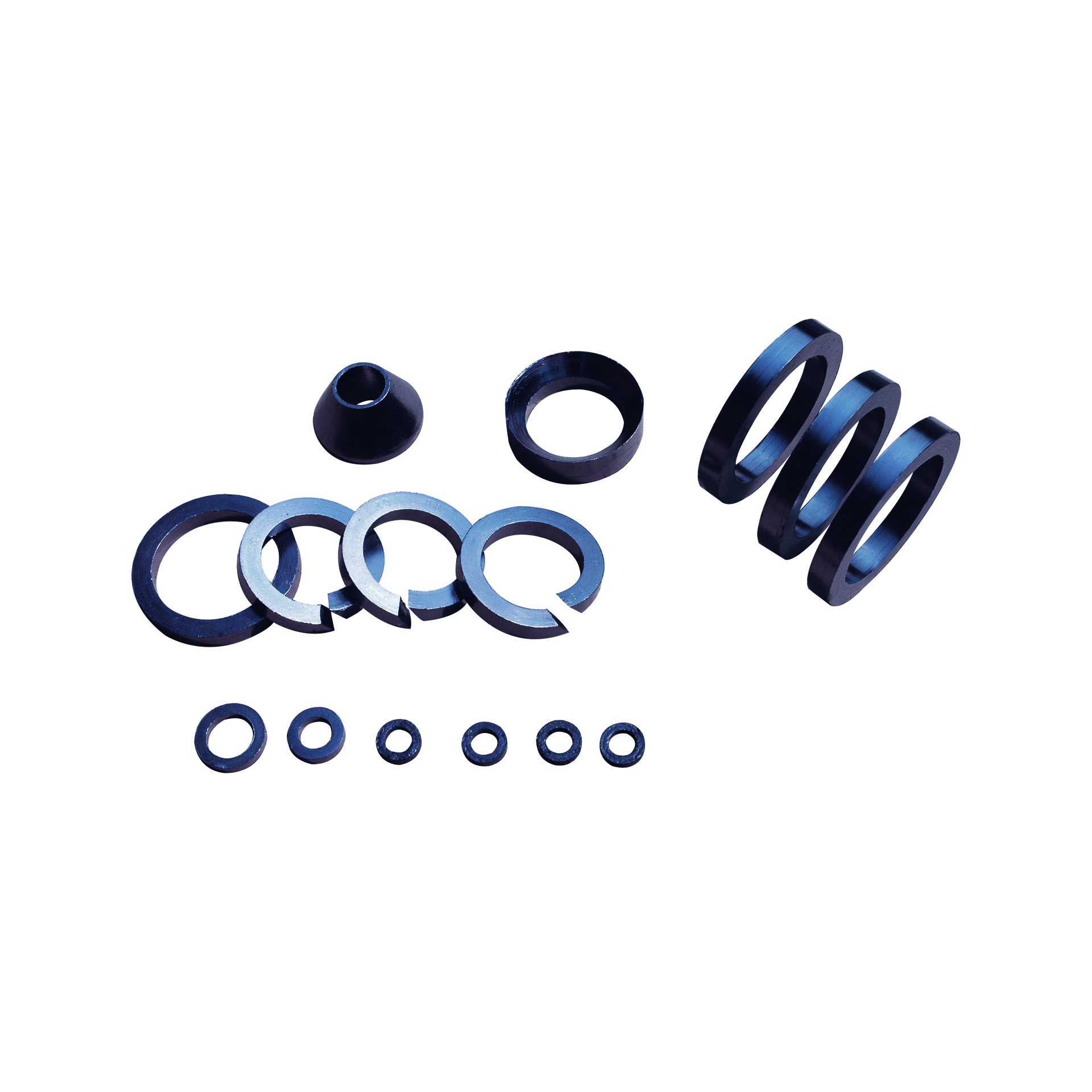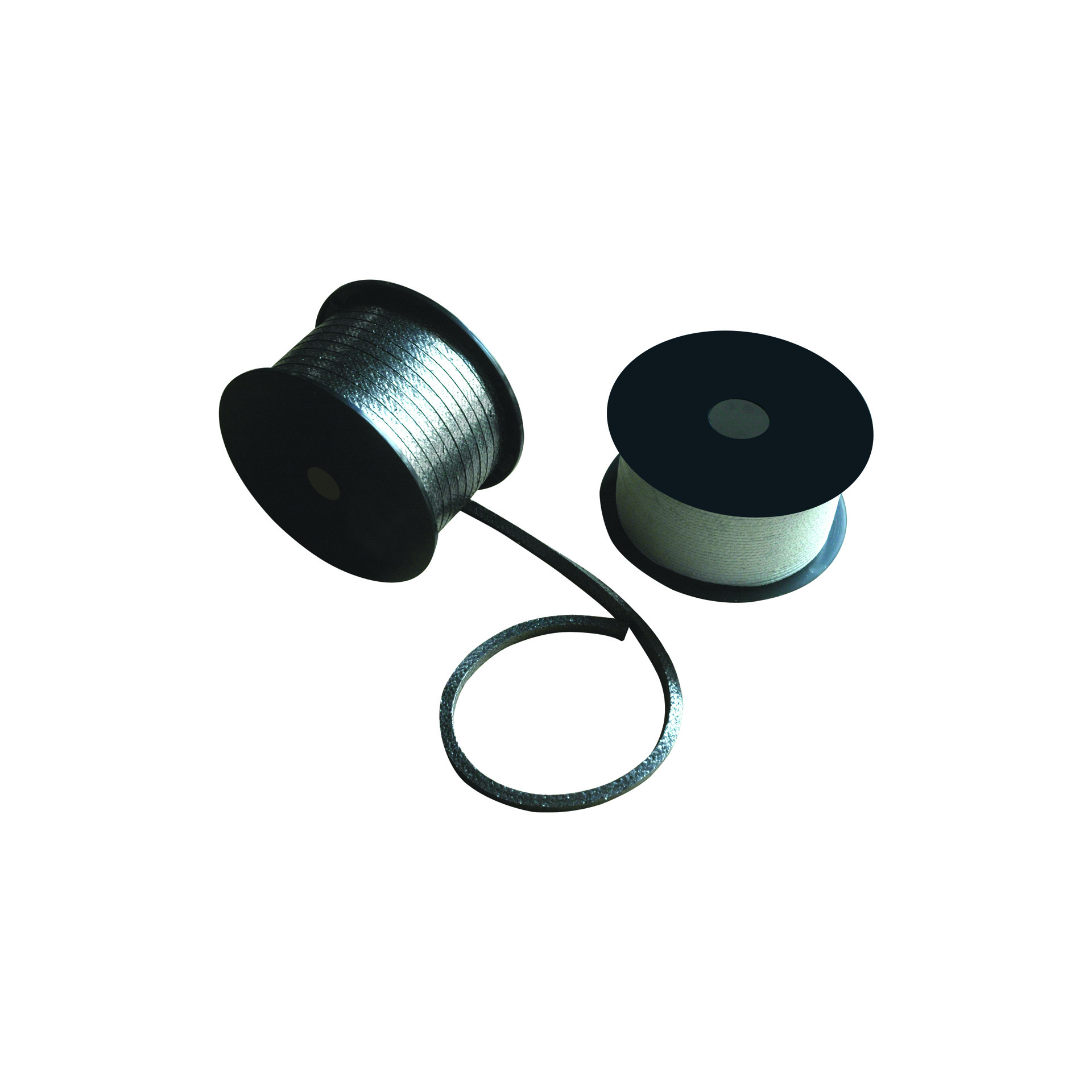Graphite packing ring
General Features
Molded from flexible graphite tape, metal material can be added for reinforcement. Has good elasticity, chemical stability, corrosion resistance, high temperature resistance, high pressure performance.
Product Specifications
φ8~φ1100mm
Description
Usage
Mainly used for the sealing of valves, pumps, expansion joints, etc. in petroleum, chemical, thermoelectric, nuclear power and general industrial applications. Used for stem seals such as low leakage rate shut-off valves, isolation valves, and regulating valves.
Applications
Working temperature: -196°C~600°C
Working pressure: ≤43.1MPa
Transportation and Storage
Prevent rain and moisture during transportation.
Should be stored in a clean, dry warehouse.
Technical Parameters
| performance | Units | Indicators | ||
| Single Flexible Graphite | Metal composites | |||
| Inside | mm | H11 | ||
| Extra trail | mm | h12 | ||
| Density | g/cm3 | 1.4-1.7 | ≥1.7 | |
| Compression ratio | % | 10~25 | 7~20 | |
| Rebound rate | % | ≥35 | ≥35 | |
| Thermal weight loss | 450°C | % | ≤0.8 | — |
| 600°C | % | ≤8.0 | ≤6.0 | |
| Coefficient of friction | — | ≤0.14 | ≤0.14 | |
Installation Instructions
Place the packing ring in the stuffing box, preload with gland bolts, compress the entire packing assembly by 15% to 20%, and record the torque of the gland nut. Then turn the valve stem for 5 switching cycles. After each rotation, tighten the gland nut to the previously recorded torque value.
Main products
| Item | Name | Item | Name |
|---|---|---|---|
| DP2201 | graphite filler ring | DP2225 | 304 stainless steel mesh reinforcement ring |
| DP2202 | Shaped Filler Ring | DP2226 | 316 stainless steel mesh reinforcement ring |
| DP2203 | Voc Packing Ring | DP2227 | Inconel Wire Reinforced Packing Ring |
| DP2205 | Inner and Outer Ring Reinforced Fillers | DP2235 | 304 stainless steel wire reinforced filler ring |
| DP2212 | Copper-based Graphite Filler Ring | DP2236 | 316 stainless steel wire reinforced filler ring |
| DP2213 | lead foil-based graphite packing rings | DP2237 | Inconel Reinforced Packing Ring |
| DP2214 | Aluminum foil-based graphite packing ring | DP2245 | 304 stainless steel ring based packing ring |
| DP2215 | 304 stainless steel foil-based graphite filler ring | DP2246 | 316 stainless steel ring-based packing ring |
| DP2216 | 316 stainless steel foil-based graphite filler ring | DP2247 | Inconel Ring Packing |
| DP2217 | Inconel-based Graphite Filler Ring |
Package Ring Use Maintenance and Operation Maintenance
Causes of sealing failure
Volume loss and brittleness during use of woven fillers
Damaged packing ring during installation
Lack of cover load
Poor thermal shock resistance of filler
Filler wear, slack, volume loss results in reduced lid load
Packing ring size deviation is too large
The depth of the stuffing box design is irrational
Shaft (bar) surface is rough
Axis (bar) and stuffing box are different
Spindle (rod) erosion or filler wear in operation
Use maintenance
Correct design of stuffing box size
Carefully install the packing ring
Packing box depth meets design specifications
Shaft (bar) surface should be smooth
Proper gland loading and load adjustment capability
There are measures to compensate for the wear of the packing, such as gland nuts and disc spring washers
Shaft (rod) has good support
Packing and stuffing box have the correct fit clearance
Correctly install and compress the packing before running.
Operation and maintenance
1. After the seal packing is assembled, it can be put into operation. Before the official start of the car, you should start the test run slowly with human power. In operation, if the torque is too large, it may be caused by the tightness of the packing gland. It may be appropriate to loosen the gland bolt and adjust it until the frictional resistance becomes smaller without leakage.
When starting operation, if the friction torque is large and the temperature of the stuffing box rises, the preload may be too great. Measures must be taken to adjust and, where circumstances permit, appropriate leakages should be controlled. For most non-harmful media centrifugal pumps, a small amount of droplet leakage should be maintained in normal conditions to provide cooling and lubrication.
2, after the official drive, we must adhere to observe on time, pay attention to whether the leakage and the temperature of the stuffing box meet the requirements, if any abnormalities, to immediately adjust. If the leakage is greater than the allowable value, the gland can be tightened.
3, storage of filler
1) The sealed packing should be stored in a normal temperature, ventilated place; prevent direct sunlight, in order to avoid aging deterioration. It must not be stored in the vicinity of corrosive materials such as acids and alkalis, nor should it be stored in high-temperature radiation or in low-temperature and humid environments.
2) During handling and inventory, care should be taken to prevent sand, dust and foreign matter from sticking to the packing. Once the debris is adhered, it must be completely removed to avoid damage to the shaft surface after assembly and affect the sealing effect.
3) For the sealed packing used in nuclear power plants, in addition to the above points, care should be taken to avoid contact with substances containing chloride ions.
Pre-tightening force estimation method for bolts
M = 0.785(D2-d2) × dB × F/n
dB – nominal diameter of bolt (mm)
F – bolt load (MPa) braided packing by 38MPa, graphite packing ring by 26MPa, or by 1.5 times the medium pressure
N – number of bolts




